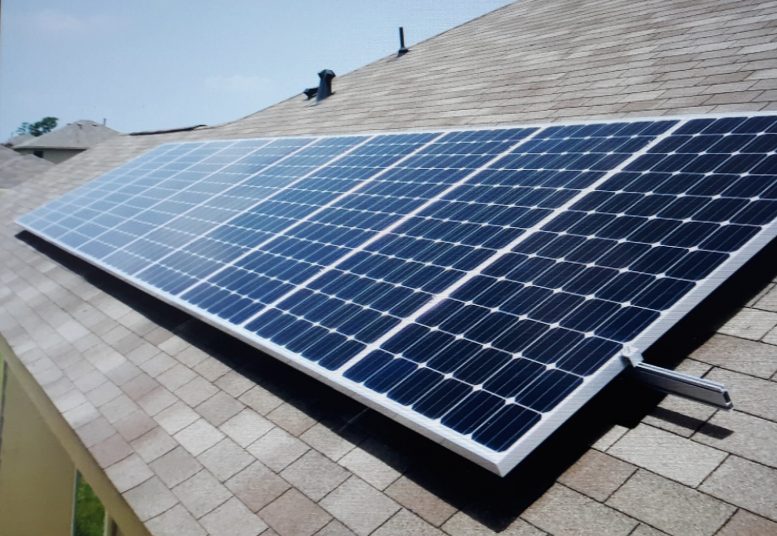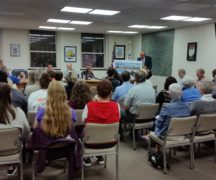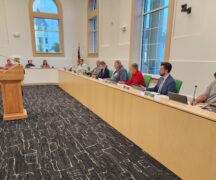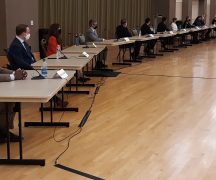By JAN LARSON McLAUGHLIN
BG Independent News
Bowling Green City Council split 4-3 last week over an ordinance giving rebates to homeowners with rooftop solar systems tied into the city’s electric grid.
Voting for the proposal were Bill Herald, who introduced the legislation, Jeff Dennis and Rachel Phipps. Voting against it were Council President Mark Hollenbaugh, Joel O’Dorisio, Greg Robinette and Nick Rubando.
Those opposed sided with the city administration, which said the ordinance would undermine the city’s Board of Public Utilities.
The rooftop solar issue became a flashpoint in 2021 when the Board of Public Utilities began charging a fee for homeowners with rooftop solar that tied into the grid.
City officials called it a reasonable “fee” while rooftop solar users said it was an unfair “fine.”
Herald insisted that while the impetus for the ordinance was the rooftop solar fee set by the board of public utilities, the rebates would not reflect negatively on the board.
The fee will discourage residents from installing rooftop solar panels, according to some with systems in place. They say that the “green” image of Bowling Green is being tarnished by the rooftop solar policy.
But Brian O’Connell, director of the city’s public utilities, said the fee is necessary to make sure other electric customers in the city aren’t paying for those who choose to install rooftop solar panels.
The electric rates in the city are based on customers buying their energy from the city. A smaller portion of the rates is based on fixed electric system costs for such items as meters, poles, wire, transformers, switches and linemen – items needed for all homes including those with rooftop solar, O’Connell said.
“Those fixed costs don’t change just because someone decides to put rooftop solar on their home,” he said.
The city reimburses rooftop solar systems for the extra energy they produce and send to the city’s grid to be shared with other users. But without that fee being charged to homes with their own solar power, “the other customers are subsidizing their energy sales,” O’Connell said.
In an effort to encourage rooftop solar, Herald proposed offering a rebate for the residents. A rebate system could incentivize the use of renewable energy and take care of the Board of Public Utilities concerns about fair electric costs for all customers, according to Herald.
The ordinance does not dispense of the facilities charge, Herald pointed out.
“It’s the exact opposite,” he said.
Under the proposed “Residential Renewable Resource” ordinance, Bowling Green residents who have installed rooftop solar systems on their homes and tied them into the city’s grid will be eligible for a one-time payment of $1,000 from the city.
The goal is to incentivize and assist in the initial installation of the rooftop solar system and other green energy generation. The ordinance states that the municipal electric grid would benefit from the electric source diversity of widespread citizen adoption of approved renewable sources.
“It’s like a pilot program. Let’s get it started and see what happens,” Herald said.
But Mayor Mike Aspacher said the legislation would infringe on the Board of Public Utilities autonomy.
In a letter to City Council, the city administration said the legislation appears to be an attempt to negate the rooftop solar policy put in place by the BPU.
“That policy, and associated nominal charge to affected customers, was put in place as a way to cover the cost of service of the electrical infrastructure, and as a way to eliminate rate payers subsidizing those customers who chose to install their own electrical generation system,” the letter stated.
“If adopted, this legislation would undermine the authority of the BPU. The BPU was established as an independent and non-political entity, put in place to remove politics from our utilities,” the letter continued.
The source of the rebate funding is also a sticking point. It could come from the city’s income tax, and would be paying citizens for choices they make – raising the question of equity among city electric customers. Or the rebate funds could come from utility accounts, which is an overstep by City Council, the mayor said.
“It undermines the authority of the Board of Public Utilities,” Aspacher said.
Council member Jeff Dennis sees the legislation differently.
“I have not talked to anyone though who does not support incentivizing renewable energy,” Dennis said.
He pushed back at the administration’s stance that City Council does not have the ability to enact such policy. He also questioned the argument that this legislation undermines the board of public utilities.
“I don’t view this legislation as doing that at all,” Dennis said. “Instead, I think this is an example of a member of council responding to constituent concerns and attempting to craft a new program that incentivizes behavior that we all seem to agree is desirable.”
Rubando said city council should work with the administration to find other ways to increase the diversity of its grid.
“I appreciate what you are doing,” Rubando said to Herald. “I just think we should heed the words of the administration.”
Hollenbaugh questioned the use of taxpayer money for rebates.
“There’s been some talk of disparity of income,” he said, adding that the rebates would give tax dollars to residents who can afford to invest in solar power.
O’Connell has repeatedly stressed that Bowling Green is committed to solar energy – evidenced by the largest municipal-owned solar field in the state, located east of the city.
“We are not against renewable energy,” he said. “But there’s also a financial obligation to make sure the system is kept whole.”
The city is pleased to credit rooftop solar homeowners for the extra energy they produce during peak times, he said. “We realize there’s a value for that.”
If residents with rooftop solar don’t pay the fee, “the other customers have to make up the difference,” O’Connell said. “Our job is to determine what is fair to charge across all customer classes.”
“Our job isn’t to incentivize,” he said. “Our job is to make sure every customer is treated fairly.”
The city of Bowling Green boasts the second highest use of green energy of any municipality in Ohio. Of the 40% renewable energy used to power the city, 34% is from hydro, 5% from solar, and 1% from wind.
“We certainly aren’t trying to create a disincentive,” the mayor said. “We respect these homeowners. But his job is to oversee a municipal electric system that provides reliable, safe, electric for all of our customers,” he said of O’Connell.
“Our job is to recover the costs,” O’Connell said.





